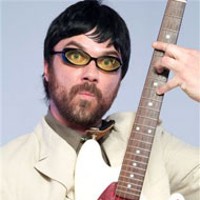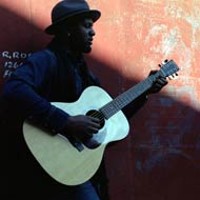A few years back, Cash put out a three-CD collection of songs, variously titled Love, God, and Murder. Consisting of Johnny's greatest hits concerning each of those topics, the three records are all equally moving -- just as, to Cash, the topics were all of equal importance. Unlike many of his contemporaries, Johnny could go from a gospel song to a love song to a murder ballad in no time flat; these were, after all, just different aspects of common human experience. The fact that he was willing to face those kinds of hard facts, and then turn around and create art from them, was what made him more real, more authentic, than most other singers.
All those country outlaws of the 1970s -- Willie, Waylon, Tompall Glaser -- probably wouldn't have existed without there first having been a Johnny Cash. Johnny, of course, wasn't so much an outlaw as he was brutally honest. That way, if you liked him, you got no surprises. If you didn't, well, that was all right too -- usually. (Cash once broke every light at the front of the Grand Ole Opry stage in a fit of anger -- "There were 52 lights, and I wanted to break all 52, which I did," Cash said matter-of-factly in a 1993 interview.)
The music we call alt-country also owes a debt (and probably its very existence, to some extent) to Johnny Cash. Equal parts rockabilly, gospel, and rough-hewn country, his music was American to the core -- and it didn't matter what kind of American you were. Johnny was able to see the beauty in any kind of music, as long as it had an authenticity, an honesty, to it.
Rick Rubin, no dummy, knew the glory days of Johnny Cash, as well as the copious iconography. The famed producer saw that the 1980s Cash was locked in with a Nashville crew pumping out records that didn't do Cash justice, and decided to sign him to his label -- which, coincidentally enough, was named American Records. Rubin knew Cash could make a cover song his own within a few bars, so he began to collect songs from artists like Tom Petty, Soundgarden, and, perhaps most notably, Nine Inch Nails, the better to market Johnny to a younger-skewed, more appreciative audience. The records were put out with a simple, block-lettered "Cash" on the front, usually with a simple black and white photo of Johnny looking pensive (or ready to kick ass. Who can tell?)
Just as he had risen after bottoming out on drugs, Cash was soon beginning a second act. He was hitting the stage of life once again, this time with the fervor of a man half his age combined with the hard-won wisdom of a man twice his age. He resurrected himself, reinvented himself, and re-established himself all at once. He collected and connected to a whole new group of fans, even as he lost some of his old ones.
He remained, of course, 100 percent Cash. After selling an impressive amount of records without so much as a hint of country radio play, Rubin used a classic image of Johnny in an ad that went out to various publications. Sarcastically thanking them for all their "support," it featured a young Cash holding a guitar and flipping off the camera with barely controlled vitriol. It was a marketing stunt, to be sure, but Cash was said to have gotten a kick out of it.
Johnny's last couple of releases dropped a bit in quality from the first two "American Recordings," and some folks began accusing Rubin of using Johnny as a sort of personal jukebox (cashbox?). I was one of them. When I saw Rubin had Johnny covering Nine Inch Nails' song "Hurt," I grimaced. Like Johnny at Folsom Prison, I too said some words you can't put on a record. And then I heard it, and saw how Johnny was able to connect to the young man who wrote it, Trent Reznor, and make the song his own even as he made it even more Trent Reznor's and everybody else's. I played the song, probably cried a little, and then played it again three times in a row. "Everyone I know/goes away/in the end," Johnny sang, and he was right. Damn it, he was right.
No doubt Cash is somewhere right now with his darling June Carter, confounding someone's expectations of him. If he's in the heaven he sang of so convincingly, he ought to be easy to spot -- he'll be the one in black. More than likely, though, he's wherever the common man is, the man that he sang about so many times in his long and illustrious career.
Ladies and gentlemen, he was Johnny Cash.
Speaking of Vibes_feature3.html
-

Real Life Top 5
Jul 20, 2005 -

Real Life Top 5
Jul 13, 2005 -

Follow No More
Jun 22, 2005 - More »
Latest in Music Features
More by Timothy C. Davis
-

Smoke This Issue: Eats
Apr 18, 2012 -
Joe Firstman tonight (Nov. 10) at The Evening Muse
Nov 10, 2010 -
Hot Rize tonight (Nov. 5) at McGlohon Theatre
Nov 5, 2010 - More »
Calendar
-
Hozier - Unreal Unearth Tour 2024 @ PNC Music Pavilion
-
The Rock Orchestra By Candlelight @ N.C. Music Factory
-
Beach Fossils with friends Nation of Language @ The Underground
-

Haw River Wine Tasting @ Carolina Beer Temple.
-
ATTILA, BORN OF OSIRIS w/ TRAITORS, EXTORTIONIST, NOT ENOUGH SPACE @ The Underground
-
Charlotte Video Project: Forever FC
From Sept. 11 through Sept. 15, Vibes will unveil 11 music-related videos.
-
Justin Fedor's tribute shows benefit Levine Children's Hospital
Charlotte musician's concert series takes place at the Neighborhood Theatre
-
Live review: Kings of Leon 21
A live review, photos and setlist from the Kings of Leon concert at Bojangles Coliseum on April 30, 2009.













